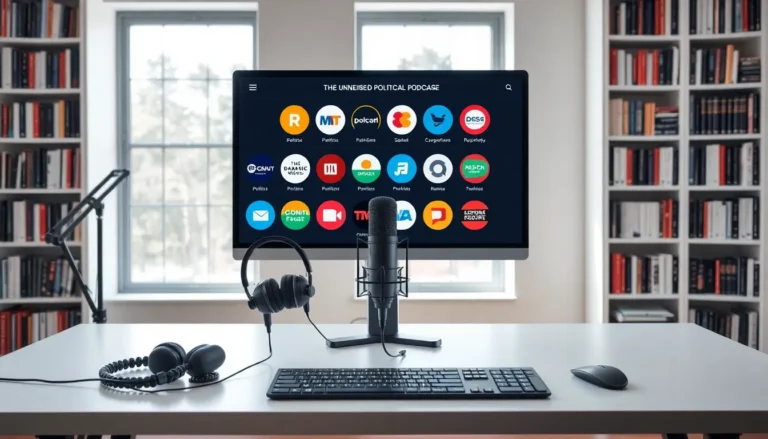In a world that often feels like a dramatic tug-of-war between extremes, political moderates represent the balancing act that keeps sanity intact. Why are they significant? Think of a political moderate as the adult in the room during a playground squabble. While the extremes throw tantrums, moderates seek solutions that can actually work. In this text, we will peel back the layers on what it means to be a political moderate, exploring their role in today’s divided climate, a space where nuance meets necessity. Grab your thinking cap, we’re diving into the middle ground.
Table of Contents
ToggleDefining Political Moderation

Political moderation can be described as a mindset or ideology that embraces a middle ground between the far-right and the far-left perspectives. Instead of drowning in extremes, moderates focus on compromise, rational discussion, and evidence-based solutions. This philosophy isn’t just about a lukewarm approach: it’s about finding pragmatic solutions that address people’s needs while taking into account diverse viewpoints. In essence, moderates believe in creating a society that encourages dialogue rather than dogma.
Historical Context of Political Moderates
Throughout history, the role of political moderates has evolved. If we trace back to the founding of the United States, figures like George Washington and Benjamin Franklin embodied moderation, navigating through diverse political ideas to foster unity. Fast forward to the mid-20th century, during the civil rights movement, moderates played a pivotal role in advocating for changes that balanced human rights with societal norms. Their influence has waxed and waned, often emerging prominently during times of crisis, whether in economic downturns or social unrest.
Characteristics of Political Moderates
What sets political moderates apart? They are typically open to various viewpoints and often practice empathy towards differing opinions. They value dialogue over debate and prioritize facts over fervor. Political moderates often have:
- Flexibility: Willing to adapt their views based on new evidence.
- Pragmatism: They lean towards practical solutions that work in the real world instead of adhering strictly to ideological doctrine.
- Inclusivity: Embracing diverse perspectives enhances their decision-making, contributing to solutions that benefit a wider audience.
In an age of hyper-partisanship, these characteristics make moderates a much-needed force.
The Role of Political Moderates in Contemporary Politics
Political moderates play several vital roles in today’s landscape. They often act as bridge-builders, negotiating agreements between polarized factions. Their emphasis on compromise and understanding creates a semblance of stability in political discourse, which is particularly crucial in a democracy that thrives on collaboration.
Challenges Faced by Political Moderates
Moderates face numerous obstacles. For starters, they are often criticized from both sides: extremists view them as weak or indecisive, while purists see them as sellouts. This dual hostility can create an environment where moderates feel under constant pressure. Also, their inclination toward compromise can be perceived as a sign of weakness, leading to vocal criticism from the very base they seek to engage.
Public Perception and Misunderstandings
Many people misunderstand moderation as indecisiveness or lack of conviction. This perception arises because political discourse often favors extreme positions. As a result, the nuanced views of moderates can get lost amid louder, more confrontational voices.
The Impact of Polarization
Political polarization has significantly reshaped the landscape in which moderates operate. The stark division in political parties exacerbates confrontation, leaving little room for collaboration. As emotions take precedence over reason, moderation often feels out of reach. In this divisive atmosphere, moderates face the challenge of redefining what it means to unite disparate parties for common goals, a feat not easily achieved amidst relentless polarizing narratives.
Strategies for Political Moderates to Thrive
Navigating the political waters as a moderate requires skill and strategy. Here are some approaches that can help:
- Building Coalitions: Moderates should focus on forming alliances with like-minded individuals, creating a collective voice that can champion effective ideas.
- Engaging in Active Dialogue: Moderates should prioritize listening to diverse perspectives, fostering a culture of mutual respect that encourages open discussions.
- Advocating Practical Solutions: Focusing on actionable and evidence-based strategies can help moderates regain trust from constituents who seek real results rather than empty rhetoric.





